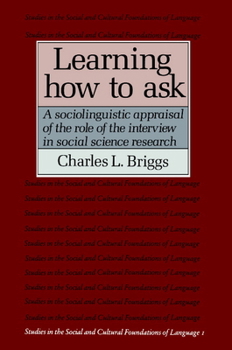Learning How to Ask: A Sociolinguistic Appraisal of the Role of the Interview in Social Science Research
(Part of the Studies in the Social and Cultural Foundations of Language Series)
Select Format
Select Condition 
Book Overview
Interviews are ubiquitous in modern society, and they play a crucial role in social scientific research. But, as Charles Briggs convincingly argues in this book, received interviewing techniques rest on fundamental misapprehensions about the nature both of the interview as a communicative event, and of the nature of the data that it produces. Furthermore, interviewers rarely examine the compatibility of interviews as a means of acquiring information to one another. These oversights often blind interviewers to ensuing errors of interpretation, as well as to the limitations of the interview as a means of acquiring data. To conflict these problems, Professor Briggs presents an analysis of the 'communicative blunders' that he himself committed in conducting research interviews among Spanish-speakers in northern New Mexico. By focusing on these errors and exploring how they may be avoided, he is able to propose new techniques for designing, implementing, and analyzing interview-based research. These rest on identifying the subjects' resources for conveying information, and the relative compatability of the shared rules and understandings that underlie their strategies with those associated with interviews. Critical of existing paradigms of interviewing, which he sees as deriving from Western 'folk' theories of reality and communication, Briggs shows that the development of more sophisticated interviewing methodologies requires further research into interviewing itself. Briggs's conclusions provide a basis for the reexamination of current uses of interviews in a wide range of contexts - from social science research to job applications, welfare and health care delivery, criminal and legal investigations, journalism and broadcasting, and other areas of everyday life. His book will appeal to linguists, sociologists, anthropologists, historians, psychologists, as well as other readers whose research or professional activities depend on the use of interviews.
Format:Paperback
Language:English
ISBN:0521311136
ISBN13:9780521311137
Release Date:July 1986
Publisher:Cambridge University Press
Length:176 Pages
Weight:0.59 lbs.
Dimensions:0.5" x 5.9" x 9.0"
Customer Reviews
1 rating
Essential Reading for Any Interviewer
Published by Thriftbooks.com User , 23 years ago
Briggs provides an excellent approach for anyone who is interested in learning how to do interviews. In the first part of this book, he provides vivid and interesting examples that reveal ways in which tacit assumptions and implicit patterns of culture can influence interviewers to make mistakes in their research techniques. What is particularly inspiring about this book, is that Briggs refuses to throw up his hands in despair about the validity of field research. He shows how understanding cultural dynamics associated with interviewing can provide useful ways to develop stronger interviews. In sum, the cultural diversity that he documents provides a stepping stone for learning about others rather than an obstacle that prevents one from researching other individuals, groups, and communities. This book is a good antidote to the practice of ethnographic navel gazing, and it should be useful to folklorists, anthropologists, sociologists, reporters, and anyone else who learns and practices interview techniques.





